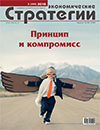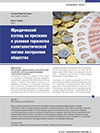Legal View on the Signs and Terms of the Capitalist Logic Triumph in Building a Society
The question, that the author posts, is what lawyers (namely legal theorists), should do with “capitalism”. Moreover, he wonders whether they competent to post that question at all. Some of economic solutions sound as definitely legal: unity of the economic system (the idea of being united within some society); natural figures as the indicators of growth instead of values and prices; legal obstacles over the process broad money creation by commercial banks. In this regard, they could try to discover some “legal” principles underlying economic system. Therefore, this essay is an attempt to “deconstruct” or to propose that some economic notions are the emanations of the mere legal thinking, not the emanations of capitalism
References:
|
1. Shchegol’kov N.M. Istoricheskie svedeniya o gorode Arzamase, sobrannye Nikolaem Shchegol’kovym: s vidami i portretami [Historical Information about the City of Arzamas, Collected by Nikolai Shchegolkov: with Views and Portraits]. Arzamas, 1911, p. 108. 2. Bol’shaya press-konferentsiya Vladimira Putina 18 dekabrya 2014 g. [Vladimir Putin’s Great Press Conference December 18, 2014], available at: http://www.kremlin.ru/events/president/news/47250. 3. Sklovskii K.I. Sobstvennost’ v grazhdanskom prave [Property in Civil Law]. Moscow, 2010. 4. Goode R. Commercial Law, 2004. P. 449. 5. Tulin D.V. Sila deneg. Ocherki po voprosam denezhnogo obrashcheniya, kredita i bankovskogo dela [The Power of Money. Essays on Money Circulation, Credit and Banking]. Moscow, 2012, p. 40. 6. Moss M. Ocherk o dare [Essay on the Gift]. V kn.: Obshchestva. Obmen. Lichnost’: Trudy po sotsial’noi antropologii [Societies. Exchange. Personality: Works on Social Anthropology]. Moscow, 1996, p. 87. 7. Svod zakonov Rossiiskoi imperii [Code of Laws of the Russian Empire]. T. 9. Osoboe prilozhenie. Saint Petersburg, 1902. 8. Soto E., de. Zagadka kapitala. Pochemu kapitalizm torzhestvuet na Zapade i terpit porazhenie vo vsem ostal’nom mire [Mystery of Capital. Why Capitalism Triumphs in the West and Fails in the Rest of the World.]. Moscow, 2001, p. 174. 9. Veniaminov P.P. Krest’yanskaya obshchina: Chto ona takoe, k chemu idet, chto daet i chto mozhet dat’ Rossii? [Peasant Community: What is it, Where is it Going, What does it Give and What Can it Give to Russia?]. Saint Petersburg, 1908, p. 17. 10. Vorontsov V.P. Ucheniya o proiskhozhdenii zemel’noi obshchiny v Rossii [Teachings on the Origin of the Land Community in Russia]. Vestnik Evropy, 1910 (April), p. 268. 11. Kachorovskii K.R. Russkaya obshchina [Russian Community]. T. 1. Saint Petersburg, 1900, p. 152. 12. Khauke O.A. Krest’yanskoe zemel’noe pravo [Peasant Land Law]. Moscow, 1914, p. 48. 13. Mattei U., Sukhanov E.A. Osnovnye polozheniya prava sobstvennosti [Main Provisions of the Ownership Right]. Moscow, 1999, p. 304. 14. Smit A. Issledovanie o prirode i prichinakh bogatstva narodov [An Inquiry into the Nature and Causes of the Wealth of Nations]. Moscow, 2007, p. 190. 15. Rikardo D. Nachala politicheskoi ekonomii i nalogovogo oblozheniya [On the Principles of Political Economy and Taxation]. Moscow, 2008, P. 289. 16. Rybas S.Yu. Moskovskie protiv piterskikh: Leningradskoe delo Stalina [Moscow vs Petersburg: Leningrad Case of Stalin]. Moscow, 2013, p. 134. 17. Gustafson T. Koleso Fortuny: bitva za neft’ i vlast’ v Rossii [Wheel of Fortune: the Battle for Oil and Power in Russia]. Moscow, 2017, p. 146. 18. Telser L.G. Why There are Organized Futures Markets. Journal of Law and Economics, 1981, no 24, pp. 1–24. 19. Goryainov S.A. Bitvy almaznykh baronov [Battles of Diamond Barons]. Moscow, 2013, p. 278. |



